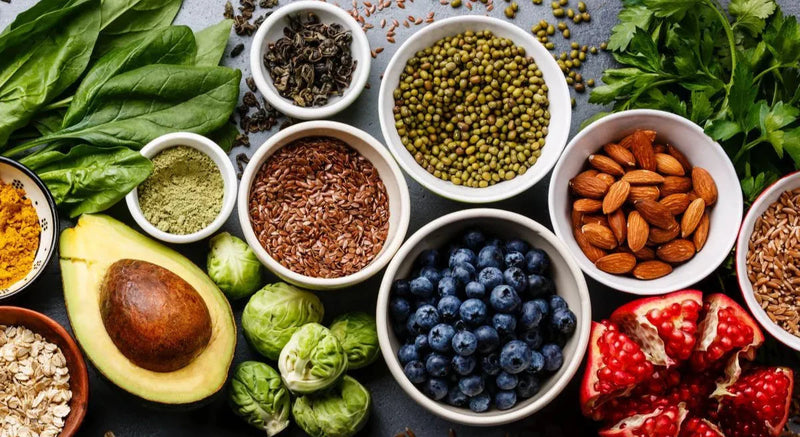Let's Talk Sugar!
'No Refined Sugar', that’s a good thing isn’t it?
How often do you see food labels or recipes described as ‘refined sugar free’? It’s a phrase we see more and more often, and I’m sure most of us think ‘oh that’s going to be the healthier option’.
You’d have to be living on another planet to have missed the ‘discussions’ concerning refined sugar in recent years, so it’s not surprising that more people are becoming interested in this topic.
I think many nutrition professionals would agree that refined and non refined sugar are very misleading terms for people. It’s time to start thinking in terms of ‘free’ and ‘non free’ sugar.
Non-free sugar
These are sugars that are naturally contained within the cell structure of foods, such as the sugars in whole fruit and vegetables and wholegrains. As these sugars are contained within the cell wall our bodies have to work harder to ‘free’ them, meaning the sugars are released in to the blood stream much slower and do not cause the same elevation in blood sugar levels.
Fruit, vegetables and grains are also higher in fibre, which also helps to stabilise blood sugar levels. And of course they contain a whole host of vitamins, minerals and beneficial phytochemical that can lower our risk of developing diseases such as cardiovascular disease, Alzheimer’s and various cancers.
Free sugar
These sugars are not contained within cell structures, they have been processed in some form or another, to release or ‘free’ the sugar. They are rapidly metabolised and released in to the blood stream causing blood sugar levels to rapidly rise.
But the interesting thing to beware of here is, that free sugar isn’t just the sugar we see in bags on the supermarket shelves, granulated, caster sugar, muscavado sugar etc, or the sugar contained in baked goods and sweets. So called ‘healthy’ sugars including maple syrup, honey, agave, brown rice syrup, corn syrup are also free sugars as sugar molecules have been ‘freed’ and are not contained within cell walls.
Yes these ‘natural’ sugars may contain nutrients not found in standard refined sugar, but in such small amounts that you would need to eat an awful lot to obtain any benefits and by that point they’d be out weighed by the vast quantity of sugar!
So what’s the problem with too much free sugar?
Sugar dysregulation and increased risk of Type II Diabetes
Well it causes unbalanced blood sugar. Ideally our blood contains around 1 tsp of sugar (glucose) at one time. Blood sugar regulation is controlled by 3 hormones: cortisol, insulin and glucagon. An increase in blood sugar stimulates insulin from the pancreas and transports the glucose into cells where it is used to produce energy.
If blood sugar rises rapidly, more insulin is released to move the glucose out of the blood and into the cells. This spike in insulin usually means that in the bodies desperate attempt to regulate and maintain blood glucose and transport sugar into the cells, levels in the blood then become depleted. This rollercoaster effect (high peaks and low troughs) of blood sugar will often result in tiredness or fatigue, and a craving to eat something sweet, setting the whole rollercoaster in motion again.
The constant release of insulin means that over time, the insulin receptors on cells become desensitised or less sensitive, we can develop ‘Dysglycaemia’ the abnormal control of blood sugar levels. It will have a direct effect on daily energy levels, is linked with fatigue and can be a precursor to developing type 2 diabetes.
Premature Ageing
Excess sugar in the blood attaches to protein and lipid cells in the body and causes premature ageing of cells, collagen and elastin fibres loose their flexibility and become fragile and more susceptible to damage, (read my Vibrant Ageing post here).
Inflamation
Sugar is a major cause of inflammation in the body. Inflammation is often at the root cause of many health conditions, it increases the risk of developing cardiovascular disease, certain cancers, arthritis, Alzheimer’s, inflammatory bowel disease and diabetes.
Weight Gain
Excess sugar is stored as fat in the body adding to weight gain and increasing our risk of, yep you’ve got it, diabetes, cardio vascular disease and cancer. But these aren’t the only conditions that are adversely affected or linked to too much sugar. Regular headaches, hormonal imbalances, various auto-immune conditions, acne, high blood pressure, poor sleep and insomnia, PCOS and endometriosis.
Sugar Cravings
These are real, I’ve already mentioned when your blood sugar drops the body sends out signals that it needs replaced and we start that rollercoaster, but there is actually a much deeper and more concerning effect happening.
Sugar activates the opiate receptors in our brain and affects the reward centre, which leads to compulsive behaviour. Yep you read that right, there is an increasing body of research that tells us that excess sugar could be as addictive as cocaine.
Eating sugar releases opioids and dopamine. Dopamine is a neurotransmitter that is a key player of the ‘reward circuit’ associated with addictive behaviour. An excessive release of dopamine and you feel a pleasurable ‘high’ that you are then inclined to repeat.
‘Addiction’ is a strong word but, may certainly have a place in the language we use when discussing excess sugar and our desire for it.
Life without Sugar?
All that said, I am not anti- sugar, I don’t expect everyone to remove it completely from the diet, a little of the sweet stuff can be good for the soul. But I do think it is definitely worth examining our behaviour and that of our children, towards sugar. Making changes to reduce our intake isn’t always easy, not just because of those opiate receptors, but also our taste buds. It’s a case of readjusting our taste buds and our brain to accept less sweetness.
For some its about gradually decreasing and finding joy in less sweet tasting (and hopefully therefore less sugar) foods. For others a complete reset is needed. I was a sugar junkie for years and for me it took a complete cessation of sugar to rest my taste buds and break that opiate reward circuit. I still have cake from time to time, but it has to be really worthwhile home made, or artisan hand made. I really can’t abide overly sweet foods anymore, even things like normal jam and chocolate make me feel sick, it's 80% chocolate only for me these days.












